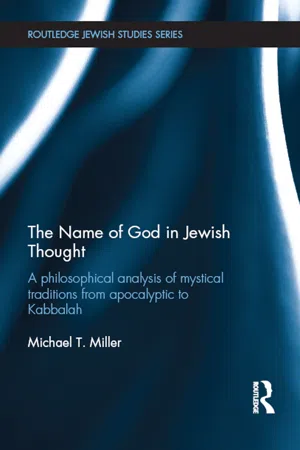
The Name of God in Jewish Thought
A Philosophical Analysis of Mystical Traditions from Apocalyptic to Kabbalah
- 188 pages
- English
- ePUB (mobile friendly)
- Available on iOS & Android
The Name of God in Jewish Thought
A Philosophical Analysis of Mystical Traditions from Apocalyptic to Kabbalah
About This Book
One of the most powerful traditions of the Jewish fascination with language is that of the Name. Indeed, the Jewish mystical tradition would seem a two millennia long meditation on the nature of name in relation to object, and how name mediates between subject and object. Even within the tide of the 20th century's linguistic turn, the aspect most notable in – the almost entirely secular - Jewish philosophers is that of the personal name, here given pivotal importance in the articulation of human relationships and dialogue.
The Name of God in Jewish Thought examines the texts of Judaism pertaining to the Name of God, offering a philosophical analysis of these as a means of understanding the metaphysical role of the name generally, in terms of its relationship with identity. The book begins with the formation of rabbinic Judaism in Late Antiquity, travelling through the development of the motif into the Medieval Kabbalah, where the Name reaches its grandest and most systematic statement – and the one which has most helped to form the ideas of Jewish philosophers in the 20th and 21st Century. This investigation will highlight certain metaphysical ideas which have developed within Judaism from the Biblical sources, and which present a direct challenge to the paradigms of western philosophy. Thus a grander subtext is a criticism of the Greek metaphysics of being which the west has inherited, and which Jewish philosophers often subject to challenges of varying subtlety; it is these philosophers who often place a peculiar emphasis on the personal name, and this emphasis depends on the historical influence of the Jewish metaphysical tradition of the Name of God.
Providing a comprehensive description of historical aspects of Jewish Name-Theology, this book also offers new ways of thinking about subjectivity and ontology through its original approach to the nature of the name, combining philosophy with text-critical analysis. As such, it is an essential resource for students and scholars of Jewish Studies, Philosophy and Religion.
Frequently asked questions
Information
1 Presence and speech Rosenzweig's ontology and the rabbinic doctrine of creation via the Name
He chose three simple letters and fixed them in his great name. And he sealed with them the six edges (of the universe).(Sefer Yetzirah §15)
[C]reation is their [objects’] emergence through separation and division. But by integrating acts of speech and naming into the sequence of creation, the Torah suggests that how the world presents itself, divided into objects and structured into kinds, is also inseparable from language.(Stern, 2009, 543)
The textual evidence
The rabbinic texts
R Abbahu said in R Johanan's name: He created them with the letter heh. All letters demand an effort to pronounce them, whereas the heh demands no effort; similarly, not with labour or wearying toil did the Holy One, blessed be He, create His world, but By the word of the Lord.(Ps.33:6)
R Jonah said in the name of R Levi: ‘The world was created by the letter bet’. As bet is closed on all sides except one, so you have no right to investigate what is above, what below, what went before or shall happen afterward, only what has happened since the world [and its inhabitants were created].(p.Hag.2:1, 16a)8
The Samaritan texts
My number was made the number of the name by which the world was created. It was repeated in both great names AHYH and YHWH, and I sealed your name, O prophet; by me Abraham and Sarah were made great.(VI.11)
Table of contents
- Cover Page
- Half Title Page
- Series Page
- Title Page
- Copyright Page
- Dedication
- Contents
- Acknowledgements
- Abbreviations
- Introduction
- 1 Presence and speech Rosenzweig's ontology and the rabbinic doctrine of creation via the Name
- 2 Losing the Name Derrida's rejection of Logos theology
- 3 The intentional Name Husserl and the Talmud on Metatron as a phenomenal object
- 4 The seventy faces of God Kripke on names, identity and the angels of the Hekhalot
- 5 The tree of names The source of logic and emanation in Wittgenstein and Gikatilla
- 6 Name and letter Deconstructing language with Abulafian prophecy and Levinasian othering
- 7 Redemption in the Name Walter Benjamin's kabbalistic Messianism
- 8 Conclusion The metaphysical meaning of the Name
- Appendix Hagiga 15a manuscript variations
- Index